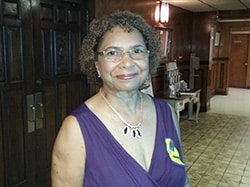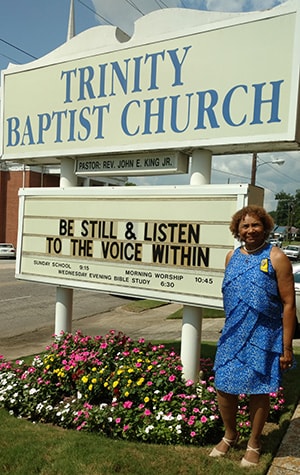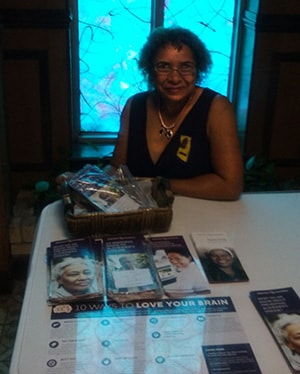What's It Like to Be a Parish Nurse?
From the Army to the Church
I like being able to help others, assist them in becoming self-sufficient, and give them information on preventing health issues and maintaining a healthy lifestyle within my church community.

Figure 1. Jacqueline H. Walker, BSN, LTC(R), RN. Courtesy of Jacqueline Walker.
Over the course of my nursing career, which spans 45 years, I have worked at numerous hospitals and military installations in the United States and abroad. I have even earned the honor and the privilege of retiring as a nurse in the United States Army with a rank of Lt. Colonel. However, my most rewarding nursing experiences are attributed to my role as parish (or faith community) nurse.
What Is Parish Nursing?
According to the
Westberg Institute for Faith Community Nursing:
Faith community nurses are licensed, registered nurses who practice holistic health for self, individuals and the community using nursing knowledge combined with spiritual care. They function in paid and unpaid positions as members of the pastoral team in a variety of religious faiths, cultures, and countries. The focus of their work is on the intentional care of the spirit, assisting the members of the faith community to maintain and/or regain wholeness in body, mind, and spirit.
I've been the parish nurse at Trinity Baptist Church in Birmingham, Alabama, since February 2016 (Figure 2).

Figure 2. Jacqueline in front of the church where she serves as parish nurse. Courtesy of Jacqueline Walker.
I have been doing nursing in my church for much longer, but the title has made it more formal. (Parish nurses have a well-defined
role, with
scope and standards of practice outlined by the American Nurses Association.) I provide services according to the needs of the congregation. We work with the
Congregational Health Program at Samford University and the Brookwood Baptist Medical Center. I set the goals for the Health Ministry, and I report to the pastor of my church to discuss the activities I have planned for each month and what I will need to accomplish our goals. To determine the health needs of the congregation, I conducted a survey and identified their top health concerns (exercise and health, weight control, arthritis, hypertension, diabetes, and the relationship between faith and health).
I am autonomous in deciding how I spend my time, and my hours vary. Although I am a senior now, I continue to teach classes on health and spirituality. I provide educational materials to the members of the congregation and I coordinate health fairs every 2 years. I also assist other organizations with their health and wellness programs. I lead support groups and encourage participation in charity walks. I also lead a group of nurses, laypersons, and a doctor to assist in rapid response in medical emergencies while at church. Although I am a volunteer, I maintain my RN license and carry malpractice insurance.
My 'Patients'

Figure 3. One of Jacqueline's roles is to provide health educational materials to the congregation. Courtesy of Jacqueline Walker.
As a parish nurse, my "patients" are the members of the congregation of a church that I have attended since I was 12 years old. My interest in the health of church members is long-standing. I remember, while in my twenties, working with my most memorable senior group at the church—a group that helped me realize that I would be in the helping profession for the rest of my life. Many of the seniors called me "Nurse" when they didn't recall my name. However, they knew that if they had a health concern, they could depend on me to explain what was happening and share the necessary steps to feel better or seek the appropriate medical intervention.
We would meet at the church on Monday mornings in the gym and have devotion, which consisted of a song, a prayer, and a Bible verse. We walked all around Bush Hills, a main thoroughfare near the church. At the end of one of these walks, I remember that one of my members would have to take a few moments to catch her breath before talking with me. For a long time, no matter when I would return from an active-duty tour, she would always inform me that she was still walking. Maintaining this type of community connection is a very important aspect of parish nursing.
My pastor at that time established a group called "Healthy Breakfast and Exercise for Seniors." I was given the responsibility of presenting them with a topic on spirituality and health each week. I enjoyed seeing their faces light up when they were able to answer a question. I admired the determination they demonstrated during the CPR course I led. Some could no longer blow hard enough to make the chest rise or push hard enough to hear the click on the manikin. However, in their faces, I could see their will to persevere, and most of them eventually completed the course successfully. These seniors had so much to share, so many stories to tell. They strived for a purpose every day, something to make them get out of bed. Even today, I am heartened when I can help church members of any age feel empowered to take control of their health.
The Challenges of Parish Nursing
The work of a parish nurse can be challenging, however. Sometimes there are not enough human and material resources to accomplish our goals. Sometimes, on the day of an event, there is simply not enough help. However, I always find joy in seeing other people smile and I am fulfilled when I am being of service. For me, if a church member learns at least one thing to make his or her quality of life better, then the sacrifice of my time and talent is worth it.
Many people have found that it isn't always easy to pray with someone who is dying, hurting, or suffering. As parish nurses, we learn that it is OK to be silent and the importance of touch.
Jacqueline Walker would like to acknowledge the assistance of Tonya Williams-Walker in the preparation of this article.



No comments:
Post a Comment